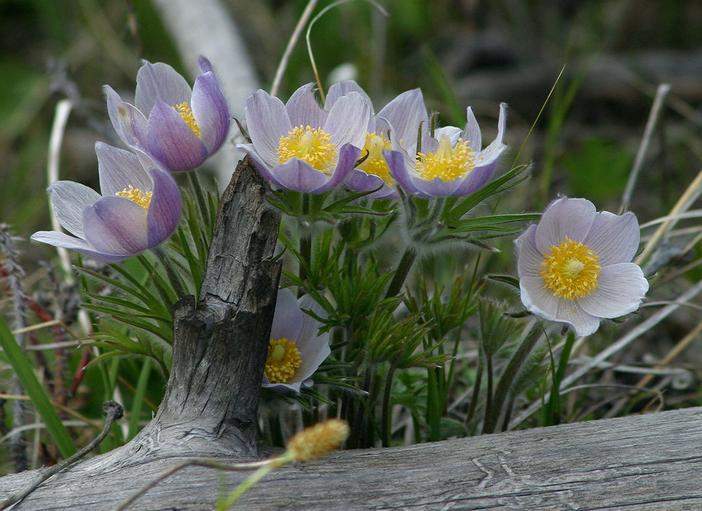American Pasqueflower
(Pulsatilla nuttalliana)
American Pasqueflower (Pulsatilla nuttalliana)
/
/

Malcolm Manners
CC BY 2.0
Image By:
Malcolm Manners
Recorded By:
Copyright:
CC BY 2.0
Copyright Notice:
Photo by: Malcolm Manners | License Type: CC BY 2.0 | License URL: https://creativecommons.org/licenses/by/2.0/ | Uploader: mmmavocado | Publisher: Flickr












Estimated Native Range
Summary
Pulsatilla nuttalliana, commonly known as American pasqueflower or prairie crocus, is a herbaceous perennial native to a variety of habitats including cool northern prairies, open slopes, fescue grasslands, and dry, open montane and boreal woodlands. It is found across North America, from the western side of Lake Michigan to the Northwest Territories in Canada and south to New Mexico. The plant typically grows 2-16 inches tall and features distinctive lavender or blue-purple flowers that bloom early in spring, often as soon as the snow melts. The flowers are bell-shaped and followed by feathery seed heads that are equally ornamental. American pasqueflower has a substantial underground taproot, which allows it to survive in tough conditions and reproduce vegetatively.
The American pasqueflower is valued for its early bloom time, providing an important nectar source for bees when few other flowers are available. It is also appreciated for its low maintenance requirements and ability to thrive in well-drained, sandy or rocky soils with full sun to part shade exposure. While it is mildly toxic to herbivores due to the presence of protoanemonin, this characteristic can be beneficial in gardens where deer and rabbit browsing is a problem. The plant is not commonly used in large-scale cultivation due to its toxicity and specific growing conditions, but it is a charming addition to rock gardens, native plant gardens, and wildflower meadows. Care should be taken when handling the plant, as its sap can cause skin irritation.CC BY-SA 4.0
The American pasqueflower is valued for its early bloom time, providing an important nectar source for bees when few other flowers are available. It is also appreciated for its low maintenance requirements and ability to thrive in well-drained, sandy or rocky soils with full sun to part shade exposure. While it is mildly toxic to herbivores due to the presence of protoanemonin, this characteristic can be beneficial in gardens where deer and rabbit browsing is a problem. The plant is not commonly used in large-scale cultivation due to its toxicity and specific growing conditions, but it is a charming addition to rock gardens, native plant gardens, and wildflower meadows. Care should be taken when handling the plant, as its sap can cause skin irritation.CC BY-SA 4.0
Plant Description
- Plant Type: Herb
- Height: 0.5-1 feet
- Width: 0.5-1 feet
- Growth Rate: Moderate
- Flower Color: Purple
- Flowering Season: Spring
- Leaf Retention: Deciduous
Growth Requirements
- Sun: Full Sun, Part Shade
- Water: Low
- Drainage: Medium, Fast
Common Uses
Bee Garden, Bird Garden, Butterfly Garden, Deer Resistant, Drought Tolerant, Low Maintenance, Rock Garden
Natural Habitat
Cool northern prairies, open slopes, fescue grasslands, and dry, open montane and boreal woodlands
Other Names
Common Names: Prairie Crocus, American Pasqueflower, Easter Flower
Scientific Names: , Pulsatilla nuttalliana, Anemone hirsutissima, Anemone ludoviciana, Anemone nuttalliana, Anemone patens subsp. wolfgangiana, Anemone patens var. multifida, Anemone patens var. nuttalliana, Anemone patens var. rosea, Pulsatilla hirsutissima
GBIF Accepted Name: